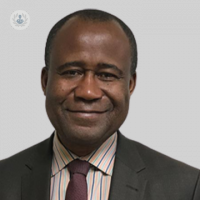When should I worry about my back pain?
Written in association with:Back pain is something that, whether severe or not, all of us will inevitably experience at some stage in our lives. In one of our latest articles, Mr Ben Okafor, a highly revered consultant trauma and orthopaedic surgeon, outlines some of the most common causes of back pain, and reveals whether or not back pain always requires medical treatment.

How common is back pain?
Back pain is extremely common. It has been estimated that at least 75 per cent of us will suffer some degree of back pain at any time in a given year.
What are the most common causes of back pain?
There are a variety of different causes of back pain. The most common ones include the following:
- stress
- inactivity or lack of exercise
- unhealthy diet
- prolonged sitting
Is it always necessary to seek medical attention for back pain?
Thankfully, in most cases, back pain can be managed at home without any need to seek professional advice. The most effective home remedies or things that you can incorporate into your daily life to improve your back pain include the following:
- medication such as ibuprofen
- applying hot/warm packs
- resting
- trying to alternate between standing and sitting
- exercising by walking or swimming regularly
- trying to lose weight to reduce the load on your spine and back muscles
- stretching regularly to reduce stiffness and increase mobility
- watching your posture - trying not to slouch or slump
- being careful when lifting
- trying frequent gentle stretches to reduce the strain on your back
- keeping active, even if you have an episode of back pain
- considering whether your bed/mattress is providing the support to your back at night
When is back pain considered to be serious?
Persistent back pain in people under the age of 16 requires medical review. Similarly, persistent back pain in any individual over the age of 60 also requires a professional medical review.
Another red flag for people with back pain is if they experience back pain which is accompanied by unintentional weight loss, lack of appetite, fever, and being generally fatigued and feeling quite unwell.
As a general rule, if back pain is not settling down despite taking painkillers for 72 hours, it is advisable to seek immediate medical review.
Book an appointment with Mr Ben Okafor today via his Top Doctors profile if you are consistently suffering from back pain and are seeking solutions to the problem.


